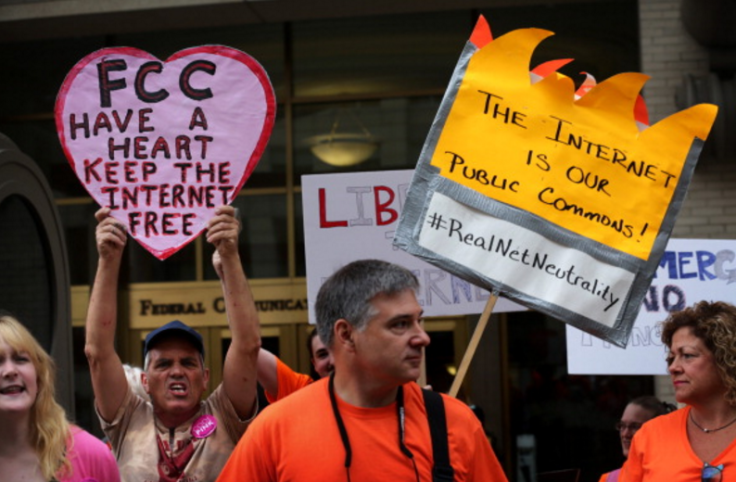Net Neutrality, Again? Why Debate On Internet’s Fate Returns To Court Dec. 4

In June 2014, John Oliver called on the viewers of his new HBO show “Last Week Tonight” to support an open Internet. Three months out, 4 million Americans sent comments to the U.S. Federal Communications Commission (FCC). By September, President Barack Obama had endorsed what has been termed “net neutrality.” In February, the FCC passed, in a 3-2 vote, equal treatment for Internet traffic and reclassified broadband providers as a common carrier.
Ten months later that decision may unravel. On Friday, Dec. 4, the U.S. Federal Communication Commission’s new rules for an open Internet and regulation of providers like Comcast, Verizon and AT&T will go before the U.S. Appeals Court for the D.C. Circuit. During that 2-hour, 20-minute hearing, three judges will listen to oral arguments and could then rule against the FCC’s February vote (though that likely would not come until next year). The decision could allow for the Internet providers to favor some websites over others for speed and access, such as those that pay more.
There are several questions the three judges can debate, such as whether Internet service providers (ISPs) have “First Amendment” rights, if those rights have been violated and if the providers were not given enough time to meet these new demands. Yet, one issue could take center stage: whether what the FCC proposed and later adopted was within its legal jurisdiction.
One of the three randomly selected judges for the hearing, David Tatel, has long had a history of demanding agencies find a legal basis for their regulations. He said in a speech at the Environmental Law Institute in 2009: “Agencies choose their policy first, then later seek to defend its legality. That gets it entirely backwards,” The Hill noted.
Overstepping Bounds
At that time, Tatel, who was appointed by President Bill Clinton and headed the civil rights office in the Department of Health, Education and Welfare during the Carter administration, was addressing environmental regulation. But he’s been deeply entrenched in the net neutrality debate. In 2010, he struck down the FCC’s actions against Comcast that forbade the provider from blocking traffic to BitTorrent. “If Tatel commands a majority, I expect he will write the opinion,” Harold Feld, senior vice president at advocacy group Public Knowledge, told The Hill.
Opponents of the FCC’s ruling, including Rep. Marsha Blackburn, have accused the FCC and the government of overstepping. “I think the issue dealing with content regulation, government having a say in that, government preceding the ISPs, at the juncture -- that is something that is of concern to me,” Blackburn, R-Tenn., told the Washington Examiner.
Proponents of the FCC ruling said the FCC's open Internet rule is not "regulating content," at all. "It is the commission preserving consumers' ability to access any lawful content of their choice, without their Internet service provider picking and choosing the 'winners and losers' of content on the Internet," Kate Forscey of Public Knowledge wrote via email to International Business Times.
Blackburn's concern does not mean she is against an open Internet for consumers. In fact, Blackburn said she sees possible additional government fees in consumers' future. “If the court upholds Title II next year, hold onto your Internet, because it's going to change,” Blackburn said. “You are going to see increased fees, you will also begin to see taxes.”
Yet an Internet that does not burden corporations, or consumers, with more fees is part of why President Obama and Wheeler pushed for Title II. “Abandoning these principles would threaten to end the Internet as we know it. That’s why I’m laying out a plan to keep the Internet free and open,” Obama said in his September 2014 endorsement. “In plain English, I’m asking them to recognize that for most Americans, the Internet has become an essential part of everyday communication and everyday life.”
Where Was The Authority?
To pass the ruling in February, which went into effect in June, the FCC relied on Section 706 of its authority, an act that grants the FCC “affirmative authority to enact measures encouraging the deployment of broadband infrastructure.” That discrepancy is one way Taley, along with other judges in the DC Court in January 2014, were able to strike down FCC’s net neutrality rules in a lawsuit filed by Verizon.
By the new rules, the FCC had reclassified Internet providers as telecommunication services -- pegging it to Chevron v. Natural Resources Defense Council case. “The term 'telecommunications service' is ambiguous and the relevant analysis of whether a broadband service includes a separate offering that is a 'telecommunications service' turns 'on the factual particulars of how Internet technology works and how it is provided,’ ” the FCC wrote, according to the Daily Dot.
Lawmakers such as Sen. Edward Markey and Rep. Anna Eshoo have come to the FCC’s defense. “It was Congress’ intent to preserve the FCC’s authority to forestall threats to competition and innovation in basic telecommunications services, even as the technologies used to offer those services evolved over time,” Markey, Eshoo and 27 other members of Congress wrote in an amicus brief.
Today, protections for #NetNeutrality go into effect. Retweet to join me in celebrating a free & open Internet!
— Ed Markey (@SenMarkey) June 12, 2015Earlier this year, the FCC worked to overcome the changes in “those services” that have “evolved over time.” In June, the FCC voted 3-2 to include broadband Internet as part of a service option for participants in the Lifeline subsidy program. FCC Commissioner Mignon Clyburn said at the time, “The sad reality is that millions of our citizens are foreclosed from opportunities, trapped in digital darkness and stranded on the wrong side of the affordability divide.”
© Copyright IBTimes 2025. All rights reserved.




















